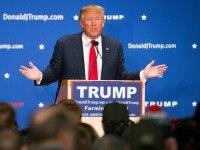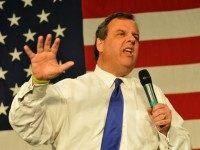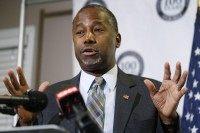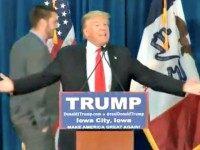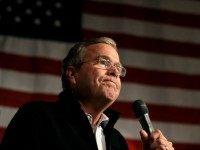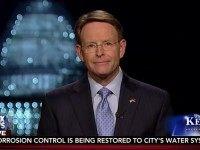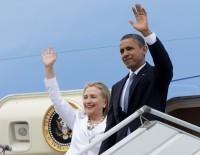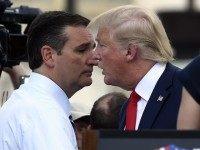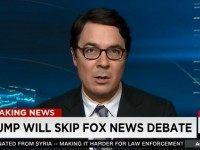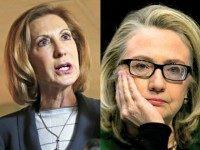Citizens Dedicated To Preserving Our Constitutional Republic
REPUBLICAN LEADERS ...RNC AND FOX NEWS ARE PLANNING A BROKERED OR CONTESTED CONVENTION ELECTION 2016NEWS AND UPDATES...etc etc
The RNC is preparing a brokered convention...to not allow Marco Rubio to win...They will bring in an establishment candidate to give it to that candidate...What can be done about that..We know it will be Jeb or Rubio..They can do this because of the ways that they have structured the riles...this is incredible.. the pick at a brokered convention never wins..they said FDR was the last to ever win a brokered convention.What they are really doing is saying they had rather elect Hillary than have Trump win............I AM TOO DISGUSTED FOR WORDS
UPDATE:
Cleveland Cliffhanger? Prospects of a Deadlocked GOP Convention
The big winner in Iowa’s Republican caucuses on Monday night might not have been Ted Cruz. It may have been a nominating process that fails to yield a clear winner. A clear winner being a candidate who goes to Cleveland this summer with the presidential nomination in hand.
At the end of Monday night, which count really mattered? Delegates acquired. As of this writing, Cruz has bagged eight delegates, Trump and Rubio, seven each, with four other delegates going to also-rans.
Raw vote totals are what most folk tend to watch and weigh. But in 2016, it pays to more closely follow the candidates’ delegate totals. Thanks to the Republican National Committee (RNC), caucuses and primaries held prior to mid-March mandate proportional distribution of delegates based on candidates’ vote totals in given contests. Most early caucuses and primaries impose threshold minimums to win delegates (say, Alabama, with a 20% threshold).
Prior to Mid-March, 25 States, along with DC, Guam, and Puerto Rico, will hold proportional contests. That accounts for 1,022 bound delegates (“bound” being delegates committed to a candidate for the first vote). 45% of the bound delegates will be picked proportionally or in “hybrid” formats, which include triggering provisions for larger delegate yields for candidates who meet higher vote percentage thresholds. There are WTA (winner-take-all) thresholds, but those will be quite difficult to achieve.
Starting with Super Tuesday, March 15, most of the remaining states have opted to hold winner-take-all contests, though a handful will continue to make proportional distributions. From mid-March forward, 1,238 bound delegates will be chosen (Colorado’s delegates declare at convention).
The number of delegates needed to secure the GOP nomination is 1,237. There are a number of unbound (3 per state) and unpledged delegates. The unpledged delegates are mostly establishment picks who would factor in at a deadlocked convention.
Short of a breakout by one the major contenders (Trump, Cruz, and Rubio), it’s not hard to imagine a scenario where the proportional phase of the nominating process yields tightly packed delegate counts among the three. Complicating matters is if new life is breathed into the Carson, Kasich, or Christe campaigns (as improbable as that appears).
But, say you, won’t the nomination fight be resolved with Super Tuesday and the subsequent contests?
That could happen, but consider this prospect. Cruz, Rubio, and Trump take roughly a third each of the delegates in the proportional phase. For illustration, say, 340 delegates per man. That means in the winner-take-all phase, one of the principals would need to capture 897 of the available 1,238 bound delegates to win. That’s about 73% of the total or three out of every four delegates. Possible, but how likely? This assumes, too, that the principals are competitive with one another, affording each the chance to pick off states.
Cruz, Trump, and Rubio have the resources to stay the course. Trump is self-funding. Cruz’s fundraising operation is already solid and benefits all the more from his Iowa win. Rubio’s stronger than anticipated finish in Iowa boosts his fundraising. And as Rubio consolidates establishment voters -- as he began doing in Iowa -- and lesser establishment candidates drop out, expect a significant upswing in his campaign’s financial fortunes.
Writes Michael Snyder at “Before It’s News”:
[I]f no candidate is able to secure enough delegates, that means that we would end up with a “brokered convention”. The mechanics of a brokered convention can get quite complicated, but on a practical level what that would essentially mean is that the party establishment would get to hand select the nominee. And in case you are wondering, that would not be Donald Trump or Ted Cruz.
Snyder’s assessment is flawed in a couple of respects (though not his conclusion about the candidates).
“Deadlocked” versus a “brokered” convention, the more accurate designation is “deadlocked.” A brokered convention suggests that party bosses call the shots nearly exclusively. The party boss era in American politics is long past.
Though unpledged delegates -- who are likely establishment recruits -- will play a critical role at a deadlocked convention, it’s important to remember that bound delegates are only committed to their candidates on the first ballot.
Thereafter, they’re unbound. Candidates’ and, perhaps, dark horses’ (yes, a draft is possible) primary focus for vote gathering will be among all those plentiful unbound state delegates. If the convention deadlocks, it’s going to be the Wild West, with plenty of wheeling and dealing, barroom brawls, shoot-outs, shenanigans, and backroom deals. But all that will occur across delegations and not just among the establishment few.
Snyder’s guess that the nominee won’t be named “Cruz” or “Trump” should a deadlock occur is reasonable. Deadlocked conventions -- if past brokered conventions are any guide -- tend to nominee candidates who at least appear more centrist or moderate. At a deadlocked 2016 Cleveland affair, the buzz word may be “electable.” Right now, Marco Rubio seems to fit the bill. As Snyder pointed out in his article, that’s not an endorsement; it’s merely an observation.
If the Republican field narrows to two principal candidates, then the chances for a deadlocked convention melt away. But if, as anticipated, Cruz, Trump, and Rubio (and possibly one or two others) remain in the race, then a deadlocked convention moves from “maybe” to “probable” with each passing primary, caucus, and state convention. The Republican presidential nominee who emerges will have done so after the fight of his political life – and ours.
The big winner in Iowa’s Republican caucuses on Monday night might not have been Ted Cruz. It may have been a nominating process that fails to yield a clear winner. A clear winner being a candidate who goes to Cleveland this summer with the presidential nomination in hand.
At the end of Monday night, which count really mattered? Delegates acquired. As of this writing, Cruz has bagged eight delegates, Trump and Rubio, seven each, with four other delegates going to also-rans.
Raw vote totals are what most folk tend to watch and weigh. But in 2016, it pays to more closely follow the candidates’ delegate totals. Thanks to the Republican National Committee (RNC), caucuses and primaries held prior to mid-March mandate proportional distribution of delegates based on candidates’ vote totals in given contests. Most early caucuses and primaries impose threshold minimums to win delegates (say, Alabama, with a 20% threshold).
Prior to Mid-March, 25 States, along with DC, Guam, and Puerto Rico, will hold proportional contests. That accounts for 1,022 bound delegates (“bound” being delegates committed to a candidate for the first vote). 45% of the bound delegates will be picked proportionally or in “hybrid” formats, which include triggering provisions for larger delegate yields for candidates who meet higher vote percentage thresholds. There are WTA (winner-take-all) thresholds, but those will be quite difficult to achieve.
Starting with Super Tuesday, March 15, most of the remaining states have opted to hold winner-take-all contests, though a handful will continue to make proportional distributions. From mid-March forward, 1,238 bound delegates will be chosen (Colorado’s delegates declare at convention).
The number of delegates needed to secure the GOP nomination is 1,237. There are a number of unbound (3 per state) and unpledged delegates. The unpledged delegates are mostly establishment picks who would factor in at a deadlocked convention.
Short of a breakout by one the major contenders (Trump, Cruz, and Rubio), it’s not hard to imagine a scenario where the proportional phase of the nominating process yields tightly packed delegate counts among the three. Complicating matters is if new life is breathed into the Carson, Kasich, or Christe campaigns (as improbable as that appears).
But, say you, won’t the nomination fight be resolved with Super Tuesday and the subsequent contests?
That could happen, but consider this prospect. Cruz, Rubio, and Trump take roughly a third each of the delegates in the proportional phase. For illustration, say, 340 delegates per man. That means in the winner-take-all phase, one of the principals would need to capture 897 of the available 1,238 bound delegates to win. That’s about 73% of the total or three out of every four delegates. Possible, but how likely? This assumes, too, that the principals are competitive with one another, affording each the chance to pick off states.
Cruz, Trump, and Rubio have the resources to stay the course. Trump is self-funding. Cruz’s fundraising operation is already solid and benefits all the more from his Iowa win. Rubio’s stronger than anticipated finish in Iowa boosts his fundraising. And as Rubio consolidates establishment voters -- as he began doing in Iowa -- and lesser establishment candidates drop out, expect a significant upswing in his campaign’s financial fortunes.
Writes Michael Snyder at “Before It’s News”:
[I]f no candidate is able to secure enough delegates, that means that we would end up with a “brokered convention”. The mechanics of a brokered convention can get quite complicated, but on a practical level what that would essentially mean is that the party establishment would get to hand select the nominee. And in case you are wondering, that would not be Donald Trump or Ted Cruz.
Snyder’s assessment is flawed in a couple of respects (though not his conclusion about the candidates).
“Deadlocked” versus a “brokered” convention, the more accurate designation is “deadlocked.” A brokered convention suggests that party bosses call the shots nearly exclusively. The party boss era in American politics is long past.
Though unpledged delegates -- who are likely establishment recruits -- will play a critical role at a deadlocked convention, it’s important to remember that bound delegates are only committed to their candidates on the first ballot.
Thereafter, they’re unbound. Candidates’ and, perhaps, dark horses’ (yes, a draft is possible) primary focus for vote gathering will be among all those plentiful unbound state delegates. If the convention deadlocks, it’s going to be the Wild West, with plenty of wheeling and dealing, barroom brawls, shoot-outs, shenanigans, and backroom deals. But all that will occur across delegations and not just among the establishment few.
Snyder’s guess that the nominee won’t be named “Cruz” or “Trump” should a deadlock occur is reasonable. Deadlocked conventions -- if past brokered conventions are any guide -- tend to nominee candidates who at least appear more centrist or moderate. At a deadlocked 2016 Cleveland affair, the buzz word may be “electable.” Right now, Marco Rubio seems to fit the bill. As Snyder pointed out in his article, that’s not an endorsement; it’s merely an observation.
If the Republican field narrows to two principal candidates, then the chances for a deadlocked convention melt away. But if, as anticipated, Cruz, Trump, and Rubio (and possibly one or two others) remain in the race, then a deadlocked convention moves from “maybe” to “probable” with each passing primary, caucus, and state convention. The Republican presidential nominee who emerges will have done so after the fight of his political life – and ours.
Read more: http://www.americanthinker.com/articles/2016/02/cleveland_cliffhang...
Follow us: @AmericanThinker on Twitter | AmericanThinker on Facebook
Replies to This Discussion
-
Donald Trump Nominated for ‘Islamophobe of the Year’ Award Previous...
U.S. presidential candidate Donald Trump has topped the list of nominees for the 2016 “Islamophobe of the Year Award,” ran by the Hezbollah-sympathising, British-based Islamic Human Rights Commission (IHRC). Breitbart London’s Raheem Kassam won the UK award in 2014. Alongside
Trump Sidesteps Sex-and-Marriage Criticism From GOP Sen. Sasse
Donald Trump waived off reporters in Iowa on Tuesday who asked him for a response to a GOP Senator who charged him with marital infidelity.
Michael Moore: ‘God Bless You Megyn Kelly’ — ‘War on Women’ Questio...
Filmmaker Michael Moore told Fox News Channel anchor Megyn Kelly “You asked a great question [to Republican presidential candidate Donald Trump], by the way. The war on women. God bless you Megyn Kelly” on Tuesday’s broadcast of the Fox News
Chris Christie on Manziel to Dallas Possibility: ‘I Will Throw My B...
The Johnny Manziel era in Cleveland could be coming to an end soon. Hue Jackson is now coaching the Browns and he is reportedly not interested in dealing with the off-field drama that comes with “Johnny Football.” That means the former
The Anti-Trump Network: Fox News Money Flows into Open Borders Group
The announcement from Donald Trump’s campaign that the Republican frontrunner will “definitely not” partake in Thursday night’s Fox News debate has sent shock waves throughout the nation’s political scene.
Dr. Ben Carson in Iowa: ‘Not Concerned About’ Whether Megyn Kelly, ...
DES MOINES, Iowa — Dr. Ben Carson, a 2016 GOP presidential candidate who will appear on the main stage of the Fox News Channel debate on Thursday here, told Breitbart News Tuesday evening he’s “not concerned” about whether moderators Megyn Kelly, Bret Baier, and Chris Wallace will be fair.
Cruz: Trump Supports Funding Planned Parenthood, I’m Beating Hillar...
Republican presidential candidate Sen. Ted Cruz (R-TX) said that fellow candidate Donald Trump “supports taxpayer funding for Planned Parenthood. Those are New York values” and pointed to polling that shows “I’m beating Hillary Clinton right now and Donald Trump’s losing to
University of Iowa Football Players Endorse Donald Trump: ‘What a T...
GOP presidential candidate Donald Trump was endorsed by the University of Iowa Hawkeye football team on Tuesday night at his rally in Iowa City, Iowa.
Jeb Bush Features Carly Fiorina Staffer on ‘Women Leaders’ Coalition
On Tuesday, Republican presidential candidate Jeb Bush released a list of 50 women who his campaign claimed were supporters of his 2016 bid for the White House.
Watch: Tony Perkins Endorses Ted Cruz for President
In an appearance on Fox News Channel’s “The Kelly File” on Tuesday, Tony Perkins, president of the Family Research Council, announced he was endorsing Sen. Ted Cruz (R-TX) for president of the United States. “I have many friends in this race,
Hillary: Nominating Obama to the Supreme Court ‘Great Idea’ — ‘I Lo...
Tuesday in on the campaign trial in Decorah, IA, Democratic presidential candidate Hillary Clinton was asked if as president she would consider nominating President Barack Obama as a Supreme Court justice. Laughing Clinton said, “Wow, what a great idea. Nobody has ever
‘You’re Fired’ Ted Cruz Mocks Trump for Skipping Fox Debate
Texas Senator Ted Cruz reacted quickly to the news that Donald Trump had decided to skip the Fox News debate in Iowa on Thursday.
Hillary Clinton Fundraises with Bon Jovi as Bernie Sanders Meets wi...
While insurgent Democratic candidate Bernie Sanders is spending Wednesday morning in the Oval Office, meeting with President Obama, his rival Hillary Clinton is kicking it that night with a different celebrity: Jon Bon Jovi.
CNN’s Ryan Lizza: Trump ‘At War’ With Fox News, ‘Conservative Intel...
CNN political commentator and Washington correspondent for The New Yorker, Ryan Lizza said, “Trump has been at war with” Fox News “all season and he is winning. He is at war with the conservative intelligentsia from National Review, to every
Carly Fiorina: Clinton’s Passivity Declares ‘Open Season on America’
It is “open season on America” for terrorist organizations when top leaders lie about the threats, GOP candidate Carly Fiorina said in a barely-concealed Tuesday rebuke of Democrat frontrunner Hillary Clinton.
-
In Houston, a Dubious Indictment National Review Online, by Editors Original Article Posted By: MissMolly- 1/27/2016 4:35:21 AM Post Reply When David Daleiden, founder of the Center for Medical Progress, launched his now-famous investigation of potential organ trafficking at Planned Parenthood, he had to know that his work would place him within the Left’s crosshairs. Planned Parenthood, after all, isn’t merely the nation’s largest abortion provider, it’s the centerpiece of the Left’s efforts to normalize the killing of unborn children as merely one aspect of “reproductive health care.” It receives hundreds of millions of dollars in government funding, President Obama has asked God’s blessings on the organization, and his administration defends it so fiercely that he once pledged to shut Obamacare´s crumbling facade Washington Examiner [DC], by John Daniel Davidson Original Article Posted By: StormCnter- 1/27/2016 4:32:02 AM Post Reply As the open enrollment period for Obamacare´s health insurance exchanges comes to a close at the end of this month, grumblings from insurers indicate that part of the healthcare law is collapsing under the weight of the administration´s desire to sign up as many people as possible, even if it means insurers lose money on the deal. UnitedHealth, the nation´s largest insurer, recently announced it expects to lose more than $500 million on the Obamacare exchanges this year — after losing $475 million last year. In November, the insurer said because of higher-than-expected cost claims it was considering pulling out of Clinton Chief Of Staff Lost Her Personal
Blackberry, Which Contained Classified EmailsDaily Caller, by Chuck Ross Original Article Posted By: StormCnter- 1/27/2016 4:26:12 AM Post Reply While working as Hillary Clinton’s chief of staff at the State Department, Cheryl Mills lost her personal Blackberry, on which she sent emails that the State Department has determined contain classified information. Records obtained by The Daily Caller through a Freedom of Information Act lawsuit show Mills revealed that she lost her Blackberry in a March 20, 2010 email she sent to Bryan Pagliano, the State Department IT staffer who managed Clinton’s private email server. “Somewhere b/w my house and the plane to nyc yesterday my personal bb got misplaced; no on [sic] is answering it thought [sic] I have called,” Mills B-G1-LC Greed Is Clinton’s Achilles’ Heel Creators Syndicate, by Debra J. Saunders Original Article Posted By: MissMolly- 1/27/2016 4:19:03 AM Post Reply When Bernie Sanders hits rival Hillary Clinton for taking humongous speaking fees from big banks — notably the $675,000 Goldman Sachs paid her for three speeches while she eyed the Oval Office — he struck Clinton’s Achilles’ heel. Both the former secretary of state and her husband, former President Bill Clinton, have cashed in since they left the White House in 2000. The New York Times reported last year that the Clintons earned $139 million from 2007 to 2014. The Clintons’ focus on accumulating wealth clouds their judgment. Start with a basic political fact: Many voters believe Wall Street got off Ryan draws Obama into veto war
to show voters what’s at stake in 2016Washington Times, by Dave Boyer Original Article Posted By: StormCnter- 1/27/2016 4:17:07 AM Post Reply President Obama’s last year in office is shaping up as the Year of the Veto. After vetoing only seven bills over the first seven years of his presidency, Mr. Obama has vetoed two measures already in January. What’s more, the White House has issued veto threats against all five pieces of legislation to come out of the House since Jan. 1, from a measure to cut “burdensome” government regulations to a bill that would give Congress greater oversight of the Iranian nuclear deal. A House vote on the latter is scheduled for the week of Feb. 1. The president, who has yet to Some Officers Bristle at
Recall of Military EquipmentNew York Times, by Timothy Williams Original Article Posted By: StormCnter- 1/27/2016 4:14:32 AM Post Reply PONTIAC, Mich. — On the day a heavily armed couple fatally shot 14 people and wounded more than 20 others in San Bernardino, Calif., last month, Michael J. Bouchard, a sheriff here in the Detroit area, got an order to return his department’s 14-ton armored personnel carrier to the federal government. It was one of hundreds of similar notifications from the Obama administration to law enforcement agencies across the country — from Los Angeles to rural areas like Calhoun County, Ala. — to give back an array of federal surplus military equipment by April 1, in response to concerns that the Poor El Chapo can’t get a
good night’s sleep in jailNew York Post, by David K. Li Original Article Posted By: MissMolly- 1/27/2016 4:10:42 AM Post Reply Joaquin “El Chapo” Guzman can barely get any shuteye in prison because of a “boisterous” guard dog and intrusive guards who check on him every waking hour, according to his lawyer. “I haven’t been able to sleep at all,” the recaptured drug lord said in a statement through his defense lawyer Jose Gonzalez. The narco kingpin — the recipient of around-the-clock attention from his Mexican jailers since his recapture on Jan. 8 — said guards check on him every hour during the day, and every two hours at night — waking him if he’s nodded off. And a “boisterous guard dog” is by A Retrospective on the Obama Years Weekly Standard, by Robert Ehrlich Original Article Posted By: StormCnter- 1/27/2016 4:06:43 AM Post Reply It has been seven years since the election of our first black president. Seven years since a supposed post-partisan (even post-racial) era was to begin. But expectations were too high, especially among those who were certain the country´s major problems were racially based. The pundits got it wrong. "Hope" and "change" turned out to be mere campaign slogans. America´s racial divide has deepened. And a previously slobbering media has (unhappily) reported on a sharply divided (and coarsened) America. Such naïve expectations had no connection to reality in the first place. State Senator Obama and United States Senator Obama was indeed articulate, charismatic, With Fox News Debate Boycott,
Has Trump Finally Jumped the Shark?PJ Media, by Walter Hudson Original Article Posted By: StormCnter- 1/27/2016 4:02:25 AM Post Reply Here´s a guy who claims he can somehow "cut deals" with America´s greatest rivals. Here´s a guy who claims that he will somehow "make America great again" through sheer force of will. Yet, when confronted by the skepticism of a 130-pound woman, he turns tail and runs. That´s the drama unfolding before our eyes as Donald Trump announces that he will boycott Thursday´s Republican presidential debate, hosted by Fox News, on account of the network´s refusal to remove Megyn Kelly as a moderator. "Let´s see how much money Fox is going to make on the debate without me," Trump reportedly said. Could Hillary’s southern
firewall come crumbling down?Hot Air, by Matt Vespa Original Article Posted By: StormCnter- 1/27/2016 3:58:59 AM Post Reply We all know Hillary Clinton is shaky in Iowa and New Hampshire. It’s possible she could lose both states, but still clinch the Democratic nomination due to her southern firewall. It’s no secret that Sen. Bernie Sanders (I-VT) does well with liberal whites. Iowa and New Hampshire have electorates that are whiter than Wonder Bread, but as we approach the Mason-Dixon line, the primary electorates become more diverse. I guess this is where the Clinton campaign plans to finish Sanders, who isn’t well known in the South. Is the optics of losing the first two early voting states bad for Christian leaders balk at
Falwell´s Trump endorsementPolitico, by Eliza Collins Original Article Posted By: Pluperfect- 1/27/2016 3:54:32 AM Post Reply Jerry Falwell Jr.’s endorsement of Donald Trump on Tuesday was swiftly met with a backlash from other Christian conservatives sounding the alarm about what they see as a dangerous candidate with questionable morals. While the official backing of Trump wasn’t a big surprise — Falwell had heaped praise on Trump last week when he spoke at Liberty University — it came during a fraught time, as many are waking up to the real possibility that Trump could win Iowa next week and embark on a glide path to the nomination. John Stemberger, president of the Florida Family Policy Council, invoked Falwell’s dad, Full statement on Trump declining to
participate in Fox News/Google DebateFox News, by Staff Original Article Posted By: Pluperfect- 1/27/2016 3:51:06 AM Post Reply As many of our viewers know, FOX News is hosting a sanctioned debate in Des Moines, Iowa on Thursday night, three days before the first votes of the 2016 election are cast in the Iowa Caucus. Donald Trump is refusing to debate seven of his fellow presidential candidates on stage that night, which is near unprecedented. We’re not sure how Iowans are going to feel about him walking away from them at the last minute, but it should be clear to the American public by now that this is rooted in one thing – Megyn Kelly, whom he has viciously attacked Michelle Obama on young
Barack: ´He was a bum´CNN, by Kevin Liptak Original Article Posted By: Pluperfect- 1/27/2016 3:48:00 AM Post Reply Washington-President Barack Obama has always been candid about his youthful transgressions -- a history his wife referenced Tuesday when explaining anyone can become a high achiever. "Barack fooled around in high school," the first lady said on the BET talk-show "The Real" during a session focused on higher education. "He didn´t take school seriously in high school. He barely got his work done. He was a bum! And it took him a second. He had to grow up a little bit," she said. Michelle Obama said her husband didn´t become serious about his education until he transferred to Columbia University Wounded Warrior Project accused
of wasting donation moneyCBS News, by Chip Reid & Jennifer Janisch Original Article Posted By: Pluperfect- 1/27/2016 3:44:18 AM Post Reply A CBS News investigation into a charity for wounded veterans, the Wounded Warrior Project, looks into how the charity spends its donation money. What caught our attention is how the Wounded Warrior Project spends donations compared to other long-respected charities. For example, Disabled American Veterans Charitable Service Trust spends 96 percent of its budget on vets. Fisher House devotes 91 percent. But according to public records reported by "Charity Navigator," the Wounded Warrior Project spends 60 percent on vets. Where is the money is going? In its commercials, Wounded Warrior Project appeals to the American public´s generosity, and it works. ´Affluenza´ Teen Drops Mexico
Appeal, Returns in 1 or 2 DaysAssociated Press, by Mark Stevenson Original Article Posted By: Pluperfect- 1/27/2016 3:41:41 AM Post Reply The Mexican lawyer for a Texas teenager who used an "affluenza" defense in a fatal drunken-driving accident says his client has dropped an appeal against deportation and will return to Texas to face charges in the coming days. Attorney Fernando Benitez said Tuesday that Ethan Couch formally ratified his decision to drop the appeal on Monday. "I gave him several options, but he decided to go to Texas to face whatever charges he faces," Benitez. The appeal had led to a court injunction against Mexico´s original decision to deport Couch. Since then, he has been held at an immigration detention center on the Immigration at center of Pope´s
visit to Mexico-US borderAssociated Press, by Christopher Sherman Original Article Posted By: Pluperfect- 1/27/2016 3:38:14 AM Post Reply REYNOSA, Mexico -- The young Salvadoran woman was robbed and forced to dodge kidnappers working for a drug cartel during her four-month odyssey to this border city of belching factories and swirling dust across the Rio Grande from Texas. She hoped to be on the other side long before Pope Francis visits the region next month and delivers what promises to be a highly symbolic homily addressing immigration. Hundreds of thousands of pilgrims will flock to the border to hear him speak, and America´s political class will likely be listening as well. Francis´ Feb. 17 Mass in Ciudad Juarez comes just Ammon Bundy and Seven Others
Are Arrested, and One Dies, in OregonNew York Times, by Julie Turkewitz & Kirk Johnson Original Article Posted By: Pluperfect- 1/27/2016 3:35:44 AM Post Reply JOHN DAY, Ore. — Ammon Bundy, the leader of an armed seizure of a federal wildlife refuge in rural eastern Oregon, was arrested and one person was killed Tuesday afternoon in a traffic stop in rural Oregon, the F.B.I. and the Oregon State Police said. Seven other people, including Mr. Bundy’s brother Ryan Bundy, were arrested, the authorities said. Another person was hospitalized with nonlife-threatening injuries. The authorities did not identify the man who was killed, but a member of the Nevada State Assembly, Michele Fiore, who has been a supporter of the Bundy family, said in a posting on Twitter that
-
How Rubio plans to take on Trump CNN, by Manu Raju Original Article Posted By: StormCnter- 1/27/2016 6:54:55 AM Post Reply Marshalltown, Iowa- Marco Rubio´s complicated path to the GOP nomination comes down to this: attrition. The Floridian is betting that the race will eventually turn into a one-on-one slugfest between him and Donald Trump -- and that the party will coalesce behind him as other establishment-backed candidates drop out, according to interviews with donors, advisers and allies of Rubio. But unlike Jeb Bush, Rubio is in no hurry to engage The Donald -- at least not yet. He´s betting Ted Cruz, who has staked much of his campaign on winning in Iowa, will lose to Trump next week here in the caucuses, seriously Cruz the Moderate American Thinker, by James V. DeLong Original Article Posted By: Desert Fox- 1/27/2016 6:27:10 AM Post Reply After reading once again that Ted Cruz is too extreme to be elected president, I went to his website to determine wherein lies this purported extremism. The bottom line is that Cruz’s positions are merely good common sense. In fact, they represent the minimum that is required if the American Republic is to survive. Here is an outline of Cruz’s positions, in the order that the website presents them: •Restore the Constitution and roll back the federal government to the functions the Constitution sets out and return power to the states and the people •Defend the Second Amendment •Secure the border, enforce the immigration laws, CNN’s Ryan Lizza: Trump ‘At War’
With Fox News, ‘Conservative Intelligentsia
from National Review’ and ‘He Is Winning’Breitbart.com, by Staff Original Article Posted By: mikkins2- 1/27/2016 6:20:20 AM Post Reply CNN political commentator and Washington correspondent for The New Yorker, Ryan Lizza said, “Trump has been at war with” Fox News “all season and he is winning. He is at war with the conservative intelligentsia from National Review, to every conservative columnist in the opinion pages, and he’s winning” on CNN’s “Anderson Cooper 360” on Tuesday. Lizza said, “On the one hand, we’re going to be talking about Donald Trump from now until the debate. We’ll probably be watching Donald Trump not on Fox, on other networks that don’t obviously take the debates live when it’s on another network. He obviously R-G6-LC Why Sharia Is Incompatible
with American ValuesAmerican Thinker, by James Arlandson Original Article Posted By: Desert Fox- 1/27/2016 6:14:13 AM Post Reply You and I don´t like sharia, while hundreds of millions love it. Chillingly, it´s still making inroads in American society. Who´s right? Are we stuck in relativism? Worse, is the side with the strongest military right? How do we break the deadlock? Any objective – timeless and transcultural – moral truths out there? It´s time to go deeper and figure out what´s happening in us that makes us recoil at it. ISIS and many Islamic nations believe, because original Islam teaches, the following: •Mosque and state are not separate. •Apostasy, or leaving Islam, is outlawed up to the penalty of death. •Speaking against Islam is outlawed up A Time for Choosing American Thinker, by Steve McCann Original Article Posted By: Desert Fox- 1/27/2016 6:07:01 AM Post Reply Among the images seared in my memory is that of standing alone at the railing of a ship on a cold and foggy winter morning sixty-five years ago when, as the sun began to break through mist, I first saw, bathed in an iridescent glow, the Statue of Liberty. I had traveled from a continent that had nearly destroyed itself and left in its wake nearly 40 million dead and millions more wounded or displaced. I came to a nation that had opened its arms to me, a nameless and displaced war orphan. Since that day I have had a love The Anti-Trump Network:
Fox News Money Flows into
Open Borders GroupBreitbart´s Big Government, by Julia Hahn Original Article Posted By: mikkins2- 1/27/2016 6:06:33 AM Post Reply The announcement from Donald Trump’s campaign that the Republican frontrunner will “definitely not” partake in Thursday night’s Fox News debate has sent shock waves throughout the nation’s political scene. At a press event Tuesday evening, Trump seemed to cite disparate treatment from the network as his reasoning for not participating. “What’s wrong over there, something’s wrong,” Trump said of the “games” Roger Ailes and the network are “playing.” In asking the question of “what’s wrong over there?” Trump has shined a spotlight on one of Washington’s best kept secrets: namely, Fox’s role via its founder Rupert Murdoch in pushing an open borders Planned Parenthood indictment:
Punishing the pursuer instead of the perpAmerican Thinker, by Robert Knight Original Article Posted By: Desert Fox- 1/27/2016 5:59:24 AM Post Reply If all else fails, shoot the messenger. On Monday, a grand jury in Houston indicted two journalists who made the explosive undercover videos that feature Planned Parenthood officials discussing the sale of aborted babies´ body parts while sipping wine in a restaurant. A felony charge of tampering with a government record was filed against Center for Medical Progress(CMP) founder David Daleiden and CMP employee Sandra Merritt. Mr. Daleiden also was charged with soliciting the purchase of human organs – as if he really intended to buy them. The grand jury was initially formed to probe whether a Houston Planned Parenthood R-TA-Wide_2 Ranking the best and worst Super
Bowl announcers, from John
Madden to Phil SimmsUSA Today, by Chris Chase Original Article Posted By: Pluperfect- 1/27/2016 4:39:49 AM Post Reply Next Sunday, Jim Nantz and Phil Simms will call the 50th Super Bowl, their fourth together, for CBS. Throughout the 50 Super Bowls, Nantz and Simms are one of 21 different announcing teams to call the game, including two pairs that shared the duties at Super Bowl I. In honor of the 50th Super Bowl, FTW ranked all 21 announcing teams who’ve ever had the honor of calling the big game. (Note: Networks alternate coverage every year, with one exception we’ll get to later. Play-by-play men are listed first, with the color analysts second.)1. Pat Summerall/John Madden (CBS; Super Bowls
-
Cruz the Moderate
After reading once again that Ted Cruz is too extreme to be elected president, I went to his website to determine wherein lies this purported extremism.
The bottom line is that Cruz’s positions are merely good common sense. In fact, they represent the minimum that is required if the American Republic is to survive.
Here is an outline of Cruz’s positions, in the order that the website presents them:
- Restore the Constitution and roll back the federal government to the functions the Constitution sets out and return power to the states and the people
- Defend the Second Amendment
- Secure the border, enforce the immigration laws, prevent any increase in legal immigration while unemployment remains high, and restore state authority to cope with immigration problems
- Rebuild our military and defend our national interests, and exert leadership on the international stage
- Stand with Israel
- Defend religious liberty and resist the pressure to make to non-religion into a compulsory national faith (and, in indirect language, oppose gay marriage and abortion)
- On the economic front: adopt a flat tax, embrace regulatory reform (including reining in EPA power grabs), repeal ObamaCare, use all our energy resources, support a stable dollar and a rules-based monetary regime, and protect Internet freedom
- Eliminate large swathes of the Federal government, including the IRS and the Departments of Energy, Education, Commerce, and HUD, along with other special-interest-based governmental units, and undertake a broad program of governmental reforms
The website contains much more detail, and specific examples of Cruz’s actions in each area.
Personally, I question a couple of things. On gay marriage, government benefits available to married couples should be available to same-sex couples via civil contracts, but the rite of marriage should be left to the churches. Abortion is a such a difficult moral problem that I am reluctant to make the choice for anyone else, so it should remain a right, but I approve of measures to ensure that the right is responsibly exercised, and no taxpayer should be forced to pay for abortion. But I certainly do not regard someone who holds a different position as “extreme.”
On other issues, one can quibble here and there, and add a “yes, but”, but the overall vision is one of a strong and proud society that relies on its people, its culture, and its civilization. There is ample room in this vision for lean, competent government, but not for the bloated, incompetent, and corrupt bodies that now exist.
Since the latest polls indicate that trust in government and faith in its competence is at a historic low, this looks like a winning position.
As for those who call this extremism – what would they define as moderation? Pursuing current bankrupt policies to their inevitable bitter end is not moderation but insanity.
James V DeLong is the author of: Ending ‘Big SIS’ (The Special Interest State) & Renewing the Am...
After reading once again that Ted Cruz is too extreme to be elected president, I went to his website to determine wherein lies this purported extremism.
The bottom line is that Cruz’s positions are merely good common sense. In fact, they represent the minimum that is required if the American Republic is to survive.
Here is an outline of Cruz’s positions, in the order that the website presents them:
- Restore the Constitution and roll back the federal government to the functions the Constitution sets out and return power to the states and the people
- Defend the Second Amendment
- Secure the border, enforce the immigration laws, prevent any increase in legal immigration while unemployment remains high, and restore state authority to cope with immigration problems
- Rebuild our military and defend our national interests, and exert leadership on the international stage
- Stand with Israel
- Defend religious liberty and resist the pressure to make to non-religion into a compulsory national faith (and, in indirect language, oppose gay marriage and abortion)
- On the economic front: adopt a flat tax, embrace regulatory reform (including reining in EPA power grabs), repeal ObamaCare, use all our energy resources, support a stable dollar and a rules-based monetary regime, and protect Internet freedom
- Eliminate large swathes of the Federal government, including the IRS and the Departments of Energy, Education, Commerce, and HUD, along with other special-interest-based governmental units, and undertake a broad program of governmental reforms
The website contains much more detail, and specific examples of Cruz’s actions in each area.
Personally, I question a couple of things. On gay marriage, government benefits available to married couples should be available to same-sex couples via civil contracts, but the rite of marriage should be left to the churches. Abortion is a such a difficult moral problem that I am reluctant to make the choice for anyone else, so it should remain a right, but I approve of measures to ensure that the right is responsibly exercised, and no taxpayer should be forced to pay for abortion. But I certainly do not regard someone who holds a different position as “extreme.”
On other issues, one can quibble here and there, and add a “yes, but”, but the overall vision is one of a strong and proud society that relies on its people, its culture, and its civilization. There is ample room in this vision for lean, competent government, but not for the bloated, incompetent, and corrupt bodies that now exist.
Since the latest polls indicate that trust in government and faith in its competence is at a historic low, this looks like a winning position.
As for those who call this extremism – what would they define as moderation? Pursuing current bankrupt policies to their inevitable bitter end is not moderation but insanity.
James V DeLong is the author of: Ending ‘Big SIS’ (The Special Interest State) & Renewing the Am...
Read more: http://www.americanthinker.com/blog/2016/01/cruz_the_moderate.html#...
Follow us: @AmericanThinker on Twitter | AmericanThinker on Facebook
-
DEBATE SCHEDULE CORRECTIONS.............
Thursday, January 28, 2016
Fox News Republican Debate
9pm ET (8pm CT, 6pm PT)
Aired On: Fox News Channel
Location: Iowa Events Center in Des Moines, Iowa
Sponsors: Fox News
Moderators: Bret Baier, Megyn Kelly and Chris Wallace
Candidates: To be determined=======================================================================
Saturday, February 6, 2016
ABC News/IJReview Republican Debate
Aired On: ABC
Location: Saint Anselm College in Manchester, New Hampshire
Sponsors: ABC News, IJReview.com, WMUR
Moderators: David Muir and Martha Raddatz
Candidates: To be determined=======================================================
Saturday, February 13, 2016
CBS News Republican Debate
Aired On: CBS
Location: The Peace Center in Greenville, South Carolina
Sponsors: CBS News
Moderator: John Dickerson======================================
Candidates: TBDThursday, February 25, 2016
CNN Republican Debate
Aired On: CNN
Location: University of Houston in Houston, Texas
Sponsors: CNN and Telemundo
Candidates: To be determined
Notes: Was originally scheduled for February 26. NBC was replaced by CNN as the sponsor, date moved to February 25.Thursday, March 10, 2016
CNN Republican Debate
Aired On: CNN
Location: University of Miami in Miami, Florida
Sponsors: CNN, The Washington Times, Salem Media Group
Candidates: To be determined================================================March, 2016*
Fox News Republican Debate
Aired On: Fox News Channel
Location: TBD
Sponsors: Fox News
Candidates: To be determined
*Debate sponsor has not yet
Read more at http://www.uspresidentialelectionnews.com/2016-debate-schedule/2016...================================================================================IOWA CAUCUS .........MONDAY FEB 1st
NEW HAMPSHIRE,,,,,,TUESDAY FEB 9th
SOUTH CAROLINA PRIMARY.........FEB 20th
NEVADA CAUCUSES ............TUESDAY FEB 23rd
-
AHhhhhh....say it ain't so Rush
Limbaugh and conservative media take Trump’s bait – Hook line and s... - 1/27/16 January 27, 2016The "Art of the Deal" becomes the art of winning. More
=======================================================================================
Running from a girl's not a New York value - 1/27/16 January 27, 2016Politics ain't beanbag, Donald. More==========================================================================Arguing capital punishment in the boxing ring - 1/27/16 January 27, 2016The death penalty came up between punches. More=======================================================================Planned Parenthood indictment: Punishing the pursuer instead of the... - 1/27/16 January 27, 2016The indictment of the videographers who exposed Planned Parenthood baby parts business is not the first time a video maker has been set up to absorb blame. More===============================================================================================Regarding Falwell endorsing Trump - 1/27/16 January 27, 2016It appears that some Christian leaders are functioning out of fear rather than faith. More============================================================================Leaky is as Leaky does - 1/27/16 January 27, 2016No matter what a word might mean for millennia, Hillary twists it. More=============================================================================This dog is going to heaven - 1/27/16 January 27, 2016Dogs protect men from mines and other dangers. More=================================================================================================================================================================================================================================A Time for Choosing Is this an election being held solely to vent anger and seek revenge? More====================================================================What Does 'Great' Mean, Mr. Trump? Some specifics from the Republican frontrunner would be nice. More====================================================================================Trump on Ending the Crony Capitalism of War A huge contractor warfighting capability has enabled US executive action to fight our wars divorced from both a sound national strategy and a connection to the American people. So far, Trump may be the only candidate to adress this problem. More===================================================================================Texas Grand Jury Shoots the Messenger What used to be called “investigative journalism” has been criminalized through the actions of the Harris County grand jury. More=================================================================================Blood Money The Iran deal is yet another example of the triumph of “hope” in Obama’s foreign policy over “realism”. More========================================================================Why Sharia Is Incompatible with American Values We all perceive the barbarity of Islamic law instinctively, but it's good to put down why in plain language. More=================================================================================
-
January 27, 2016
Is Trump the First ‘European-conservative’ American Presidential Candidate?
Ever since Donald Trump’s rise to 2016-contender prominence, the rap on him, and perhaps part of his broad appeal, has been that he’s not a conservative. And he’s not -- he’s a nationalistic populist. Yet there’s another way to understand The Donald’s professed politics: as that of the first prominent “European-conservative” American presidential candidate. He’s not so much America’s next Ronald Reagan or Barry Goldwater, but her first Marine Le Pen.
A prerequisite for grasping this is first understanding the true natures of liberalism and conservatism. While many have their own definitions of the latter -- and will stubbornly insist they’re correct -- the truth is that both political terms are provisional, meaning different things in different times and places. The term “conservative” in the 1970s referred to a communist in the USSR and someone staunchly anti-communist in the US; and a European conservative today, such as Britain’s David Cameron, is well to the “left” of our conservatives. Many other examples could be provided, but the point is this: liberalism and conservatism are not ideologies as much as processes. Liberalism is the process of inexorably trying to change the status quo; conservatism is the process of trying to preserve the status quo. Thus, what the terms represent will vary depending on the status quo in question.
And when analyzing the Trump phenomenon, it’s clear that it’s roughly the same one evident in much of the West, the one fueling the fortunes of Le Pen in France, the Netherlands’ Geert Wilders (who has endorsed Trump), Britain’s Nigel Farage and Sweden’s Jimmie Åkesson. He also bears much in common with those figures.
Consider the qualities these European politicians share: they’re socially quite liberal. Their views on abortion range from indifference to tolerance to mild skepticism, on faux marriage they range from mild opposition to acceptance. In general, they say as little about these matters as they can and are willing to play to their audience. But then there’s their real passion, about which they generally seem sincere: nationalism, limiting immigration, fighting Muslim terrorism and stopping Islamization. Sound at all familiar?
It’s also common (though not universal) among such figures to talk about preserving their nation’s “Christian heritage.” Now, it’s unimaginable that Le Pen and Wilders spend much time at an altar rail, and were Christian piety the order of the day in Western Europe, it would be easy to see them taking up the cudgels for secularism. But with already sclerotic Christian culture further threatened by a confluence of secularization and Islamization -- and with Muslim chauvinists providing stark reminders of a very unappealing alternative -- they’re inspired to become Crusaders protecting their nation’s Christian veneer.
Likewise, Trump cannot be mistaken for a desert mystic; he stated last summer that he never sought forgiveness from God (doing so is a Christian tenet), and hasn’t demonstrated much acquaintance with the faith. Yet he has also said he’s proud to be a Presbyterian, sometimes attends church and has bemoaned how Christianity is under attack in America. And whether you believe this is piety or posturing, for certain is this: it’s no surprise coming from an apparent nationalist. For being so means defending your nation’s culture, as it is, which in the West includes superficial Christianity. It means wanting to see church steeples and not minarets, crosses and not the star and crescent, and to hear church bells and not the Adhan -- even if you talk more about the Easter Bunny than Jesus.
So what accounts for the popularity in the U.S. of a “European conservative”? The same things accounting for it in across the pond. First, like Western Europe, we’re beset by a political establishment that encourages a culture-rending invasion by unassimilable peoples. And it’s just as with a “hot” invasion: all other problems are put on the back burner when barbarians are at the gate. Have you ever seen a guy wringing his hands about his daughter’s sleazy boyfriend while home invaders are busting down his door?
This helps explain why Trump is attracting support from groups most wouldn’t expect, such as evangelicals. Some find it inexplicable, but I think these believers’ attitude was reflected well by a devout Catholic man I know -- a truly faithful fellow -- who said some years back that he considered immigration an even bigger issue than abortion. His point was that all else is for naught if you’re subjected to demographic genocide and lose your nation.
Then there’s the second reason a European conservative would play well today: the US is becoming more like Europe. A not widely understood phenomenon is that the positions we generally associate with traditional American “conservatism” correlate with Christian belief. This is why church attendance is one of the best predictors of voting habits. Consider: in socialistic Western Europe, more than 50 percent of the population identifies as “irreligious.” Not surprisingly, this reaches a Richard Dawkins Award high in what’s perhaps the world’s most “liberal” country, Sweden, where 76 percent of the citizenry identifies as “not religious” or “atheist” (and how many of the rest are Muslim?). And in once-Marxist, now-fascist China, 90 percent thus label themselves.
The US isn’t yet that far gone, but we’re on the same road. According to Pew Research Center, Americans identifying as Christian declined from 78.4 percent to 70.6 percent of the population in just 7 years (2007 to 2014), and the religiously “unaffiliated” now account for almost a quarter of our nation. This just reflects the increasingly secular nature of succeeding generations: Among those born 1928 through 1945, 85 percent identify as Christian. But there is a steady degeneration of the generations, with only 56 percent of “Younger Millennials” (born ‘90 through ’96) labeling themselves so.
Yet even this paints too optimistic a picture. As this must-read Barna Group research company study found in 2002 already, only 22 percent of adults believed in Absolute Moral Truth while 64 percent said matters were “always relative to the person and their [sic] situation.” And they were practically the “wise elders”: 83 percent of the teenagers subscribed to relativism -- which is the antithesis of Christian belief -- and only 6 percent believed in Truth.
And as Barna head George Barna put it,
“[T]he alarmingly fast decline of moral foundations among our young people has culminated in a one-word worldview: 'whatever.' The result is a mentality that esteems pluralism, relativism, tolerance, and diversity without critical reflection of the implications of particular views and actions."
Put simply and as I’ve explained many times, the notion that there is no Truth means that, in essence, there are no moral rules governing man. It is then that everything boils down to occultist Aleister Crowley’s maxim, “Do what thou wilt shall be the whole of the law.”
Thus does lacking the yardstick of Truth lead to, as Barna also found, people making decisions based on what “feels right.” And now we see the rise of relativistic moderns to whom nationalism and their own culture feel right, which is certainly preferable to the dominance of relativistic moderns to whom internationalism and multiculturalism feel right. Absent acquaintance with and adherence to Truth, however, a civilization will always descend into some kind of lie. So the most we can perhaps hope for is that, to quote Yogi Berra, we won’t one day have to say, “I think I made the wrong mistake.”
Contact Selwyn Duke, follow him on Twitter or log on to SelwynDuke.com
Ever since Donald Trump’s rise to 2016-contender prominence, the rap on him, and perhaps part of his broad appeal, has been that he’s not a conservative. And he’s not -- he’s a nationalistic populist. Yet there’s another way to understand The Donald’s professed politics: as that of the first prominent “European-conservative” American presidential candidate. He’s not so much America’s next Ronald Reagan or Barry Goldwater, but her first Marine Le Pen.
A prerequisite for grasping this is first understanding the true natures of liberalism and conservatism. While many have their own definitions of the latter -- and will stubbornly insist they’re correct -- the truth is that both political terms are provisional, meaning different things in different times and places. The term “conservative” in the 1970s referred to a communist in the USSR and someone staunchly anti-communist in the US; and a European conservative today, such as Britain’s David Cameron, is well to the “left” of our conservatives. Many other examples could be provided, but the point is this: liberalism and conservatism are not ideologies as much as processes. Liberalism is the process of inexorably trying to change the status quo; conservatism is the process of trying to preserve the status quo. Thus, what the terms represent will vary depending on the status quo in question.
And when analyzing the Trump phenomenon, it’s clear that it’s roughly the same one evident in much of the West, the one fueling the fortunes of Le Pen in France, the Netherlands’ Geert Wilders (who has endorsed Trump), Britain’s Nigel Farage and Sweden’s Jimmie Åkesson. He also bears much in common with those figures.
Consider the qualities these European politicians share: they’re socially quite liberal. Their views on abortion range from indifference to tolerance to mild skepticism, on faux marriage they range from mild opposition to acceptance. In general, they say as little about these matters as they can and are willing to play to their audience. But then there’s their real passion, about which they generally seem sincere: nationalism, limiting immigration, fighting Muslim terrorism and stopping Islamization. Sound at all familiar?
It’s also common (though not universal) among such figures to talk about preserving their nation’s “Christian heritage.” Now, it’s unimaginable that Le Pen and Wilders spend much time at an altar rail, and were Christian piety the order of the day in Western Europe, it would be easy to see them taking up the cudgels for secularism. But with already sclerotic Christian culture further threatened by a confluence of secularization and Islamization -- and with Muslim chauvinists providing stark reminders of a very unappealing alternative -- they’re inspired to become Crusaders protecting their nation’s Christian veneer.
Likewise, Trump cannot be mistaken for a desert mystic; he stated last summer that he never sought forgiveness from God (doing so is a Christian tenet), and hasn’t demonstrated much acquaintance with the faith. Yet he has also said he’s proud to be a Presbyterian, sometimes attends church and has bemoaned how Christianity is under attack in America. And whether you believe this is piety or posturing, for certain is this: it’s no surprise coming from an apparent nationalist. For being so means defending your nation’s culture, as it is, which in the West includes superficial Christianity. It means wanting to see church steeples and not minarets, crosses and not the star and crescent, and to hear church bells and not the Adhan -- even if you talk more about the Easter Bunny than Jesus.
So what accounts for the popularity in the U.S. of a “European conservative”? The same things accounting for it in across the pond. First, like Western Europe, we’re beset by a political establishment that encourages a culture-rending invasion by unassimilable peoples. And it’s just as with a “hot” invasion: all other problems are put on the back burner when barbarians are at the gate. Have you ever seen a guy wringing his hands about his daughter’s sleazy boyfriend while home invaders are busting down his door?
This helps explain why Trump is attracting support from groups most wouldn’t expect, such as evangelicals. Some find it inexplicable, but I think these believers’ attitude was reflected well by a devout Catholic man I know -- a truly faithful fellow -- who said some years back that he considered immigration an even bigger issue than abortion. His point was that all else is for naught if you’re subjected to demographic genocide and lose your nation.
Then there’s the second reason a European conservative would play well today: the US is becoming more like Europe. A not widely understood phenomenon is that the positions we generally associate with traditional American “conservatism” correlate with Christian belief. This is why church attendance is one of the best predictors of voting habits. Consider: in socialistic Western Europe, more than 50 percent of the population identifies as “irreligious.” Not surprisingly, this reaches a Richard Dawkins Award high in what’s perhaps the world’s most “liberal” country, Sweden, where 76 percent of the citizenry identifies as “not religious” or “atheist” (and how many of the rest are Muslim?). And in once-Marxist, now-fascist China, 90 percent thus label themselves.
The US isn’t yet that far gone, but we’re on the same road. According to Pew Research Center, Americans identifying as Christian declined from 78.4 percent to 70.6 percent of the population in just 7 years (2007 to 2014), and the religiously “unaffiliated” now account for almost a quarter of our nation. This just reflects the increasingly secular nature of succeeding generations: Among those born 1928 through 1945, 85 percent identify as Christian. But there is a steady degeneration of the generations, with only 56 percent of “Younger Millennials” (born ‘90 through ’96) labeling themselves so.
Yet even this paints too optimistic a picture. As this must-read Barna Group research company study found in 2002 already, only 22 percent of adults believed in Absolute Moral Truth while 64 percent said matters were “always relative to the person and their [sic] situation.” And they were practically the “wise elders”: 83 percent of the teenagers subscribed to relativism -- which is the antithesis of Christian belief -- and only 6 percent believed in Truth.
And as Barna head George Barna put it,
“[T]he alarmingly fast decline of moral foundations among our young people has culminated in a one-word worldview: 'whatever.' The result is a mentality that esteems pluralism, relativism, tolerance, and diversity without critical reflection of the implications of particular views and actions."
Put simply and as I’ve explained many times, the notion that there is no Truth means that, in essence, there are no moral rules governing man. It is then that everything boils down to occultist Aleister Crowley’s maxim, “Do what thou wilt shall be the whole of the law.”
Thus does lacking the yardstick of Truth lead to, as Barna also found, people making decisions based on what “feels right.” And now we see the rise of relativistic moderns to whom nationalism and their own culture feel right, which is certainly preferable to the dominance of relativistic moderns to whom internationalism and multiculturalism feel right. Absent acquaintance with and adherence to Truth, however, a civilization will always descend into some kind of lie. So the most we can perhaps hope for is that, to quote Yogi Berra, we won’t one day have to say, “I think I made the wrong mistake.”
Contact Selwyn Duke, follow him on Twitter or log on to SelwynDuke.com
Read more: http://www.americanthinker.com/articles/2016/01/is_trump_the_first_...
Follow us: @AmericanThinker on Twitter | AmericanThinker on Facebook
-
Want change? Look for a leader, not a dealer
A man who makes deals for a living does his deals in the world as he finds it. He accepts the world as it is, and tries to make the best deal possible. He doesn't try to change the world; he deals with it.
Leaders, on the other hand, such as Washington, Lincoln, and Reagan, do not accept dealing with the status quo. Reagan didn't want to deal with the Soviet Union. He wanted to destroy it. Jimmy Carter, on the other hand, believed in détente, in building relationships and making deals. He scoffed at Reagan and his inordinate fear of communism. In 1980, we wisely chose a leader, not a dealer.
A President Trump would make a lot of deals, or try to. But you don't make America great again by making deals. American greatness rests on American principles, as set forth in the Declaration of Independence, the Constitution, and the Bill of Rights. Trump seems unfamiliar with these principles. He's more of a technician, and the fundamental law of this country is of little interest. What's that got to do with making good deals?
Trump would fit right in with the Washington deal-makers who are so contemptuous of Ted Cruz. Sen. Mitch McConnell knows how to make deals as well as Trump, and he knows how Washington works – you make deals. Like Senate majority leaders Trent Lott and Bob Dole before him, McConnell sees in Trump a man he can deal with.
In October of 2013, Cruz didn't want to deal with President Obama. He wanted to stand for the principle that only Congress has the power of the purse, and if the Congress chose not to fund Obamacare, it would not be funded, and it would die. The American people had put the Republicans back in control of the House of Representatives in 2010 in reaction to the passage of Obamacare, with the expectation that they would oppose it. Since all revenue measures must originate in the House, its refusal to fund would kill the program. Though he'd only been in the Senate for nine months, Ted Cruz was the leader of this attempt by the House to assert its constitutional authority.
Obama not only wanted Obamacare funded, but wanted a "clean" debt ceiling increase, one that did not require any spending cuts. He wound up getting everything he wanted, though there were some extraneous items added to the debt increase legislation. One in particular stood out: almost $3 billion for a dam. In Kentucky, of all places. We didn't get spending cuts; we got pork. Like Trump, Mitch McConnell knows how to deal. He had a re-election coming up in 2014 and needed to show his voters he still knew how to bring home the bacon. That's what dealers do.
It's really not hard to understand Trump's appeal. If Obama represented the "coalition of the ascendant," unmarried women, youth, and minorities, Trump represents those who seem to be descending – older, married, and white. The white working class in particular have been consciously abandoned by the Democratic Party and are well aware of it. They ask if anyone speaks for them, represents their interests, will fight on their behalf. Because Trump is so fearlessly politically incorrect, they see in him a champion.
What they want is another Reagan, and Ronald Reagan never bragged of his ability to make deals. He was a leader. The first and best example of his leadership on the domestic front was the tax cut package that was the foundation of his economic policy. Tip O'Neill ran the House with a 243-member majority. To get his bill, Reagan needed at least 25 Democrats. While he made some accommodations, he won his great victory not by making deals, but by appealing for support directly to the American people. He showed leadership, and the public responded overwhelmingly. O'Neill never knew what hit him. Reagan didn’t deal. He led.
Trump says Cruz can't make deals because nobody likes him. But Ted Cruz doesn't have to make deals if he leads. For instance, there would be no "deal" on Obamacare. It's going to be repealed. And any appropriation that contains a nickel of funding for it will be vetoed. And if the funding is in the budget and causes a government shutdown, so be it. You win by standing firm, not making deals. Mitch McConnell may never like Ted Cruz. If you think that means he'll refuse to cooperate with him as president, you have absolutely no idea of how the mind of Mitch McConnell works. Ask Kentucky's Gov. Matt Bevin about McConnell holding grudges.
Here's the deal Cruz wants with the Democrats. It's the deal Reagan wanted with the Soviet Union. We win. You lose.
Fritz Pettyjohn was chairman of Reagan for President, Alaska, in 1979-1980; is a co-founder of the Balanced Budget Amendment Task Force; and blogs daily at ReaganProject.com.
A man who makes deals for a living does his deals in the world as he finds it. He accepts the world as it is, and tries to make the best deal possible. He doesn't try to change the world; he deals with it.
Leaders, on the other hand, such as Washington, Lincoln, and Reagan, do not accept dealing with the status quo. Reagan didn't want to deal with the Soviet Union. He wanted to destroy it. Jimmy Carter, on the other hand, believed in détente, in building relationships and making deals. He scoffed at Reagan and his inordinate fear of communism. In 1980, we wisely chose a leader, not a dealer.
A President Trump would make a lot of deals, or try to. But you don't make America great again by making deals. American greatness rests on American principles, as set forth in the Declaration of Independence, the Constitution, and the Bill of Rights. Trump seems unfamiliar with these principles. He's more of a technician, and the fundamental law of this country is of little interest. What's that got to do with making good deals?
Trump would fit right in with the Washington deal-makers who are so contemptuous of Ted Cruz. Sen. Mitch McConnell knows how to make deals as well as Trump, and he knows how Washington works – you make deals. Like Senate majority leaders Trent Lott and Bob Dole before him, McConnell sees in Trump a man he can deal with.
In October of 2013, Cruz didn't want to deal with President Obama. He wanted to stand for the principle that only Congress has the power of the purse, and if the Congress chose not to fund Obamacare, it would not be funded, and it would die. The American people had put the Republicans back in control of the House of Representatives in 2010 in reaction to the passage of Obamacare, with the expectation that they would oppose it. Since all revenue measures must originate in the House, its refusal to fund would kill the program. Though he'd only been in the Senate for nine months, Ted Cruz was the leader of this attempt by the House to assert its constitutional authority.
Obama not only wanted Obamacare funded, but wanted a "clean" debt ceiling increase, one that did not require any spending cuts. He wound up getting everything he wanted, though there were some extraneous items added to the debt increase legislation. One in particular stood out: almost $3 billion for a dam. In Kentucky, of all places. We didn't get spending cuts; we got pork. Like Trump, Mitch McConnell knows how to deal. He had a re-election coming up in 2014 and needed to show his voters he still knew how to bring home the bacon. That's what dealers do.
It's really not hard to understand Trump's appeal. If Obama represented the "coalition of the ascendant," unmarried women, youth, and minorities, Trump represents those who seem to be descending – older, married, and white. The white working class in particular have been consciously abandoned by the Democratic Party and are well aware of it. They ask if anyone speaks for them, represents their interests, will fight on their behalf. Because Trump is so fearlessly politically incorrect, they see in him a champion.
What they want is another Reagan, and Ronald Reagan never bragged of his ability to make deals. He was a leader. The first and best example of his leadership on the domestic front was the tax cut package that was the foundation of his economic policy. Tip O'Neill ran the House with a 243-member majority. To get his bill, Reagan needed at least 25 Democrats. While he made some accommodations, he won his great victory not by making deals, but by appealing for support directly to the American people. He showed leadership, and the public responded overwhelmingly. O'Neill never knew what hit him. Reagan didn’t deal. He led.
Trump says Cruz can't make deals because nobody likes him. But Ted Cruz doesn't have to make deals if he leads. For instance, there would be no "deal" on Obamacare. It's going to be repealed. And any appropriation that contains a nickel of funding for it will be vetoed. And if the funding is in the budget and causes a government shutdown, so be it. You win by standing firm, not making deals. Mitch McConnell may never like Ted Cruz. If you think that means he'll refuse to cooperate with him as president, you have absolutely no idea of how the mind of Mitch McConnell works. Ask Kentucky's Gov. Matt Bevin about McConnell holding grudges.
Here's the deal Cruz wants with the Democrats. It's the deal Reagan wanted with the Soviet Union. We win. You lose.
Fritz Pettyjohn was chairman of Reagan for President, Alaska, in 1979-1980; is a co-founder of the Balanced Budget Amendment Task Force; and blogs daily at ReaganProject.com.
Read more: http://www.americanthinker.com/blog/2016/01/want_change_look_for_a_...
Follow us: @AmericanThinker on Twitter | AmericanThinker on Facebook
-
I hope to stay signed in all day today as much news is coming in and gets pushed away as more comes in...I will attempt to bring much of it throughout the day...Don't forget the next debate is tomorrow evening. Thursday 29th..my time is central so I am going for the main debate at 8pm...DVR it in and add the extensions and all the after debate shows..much more learned there....as well..........God Bless America and God Bless Ted Cruz.............He is our David against Goliath (Trump wrote the book on NASTY...........) my prayers have placed Trump into the hands of the Living God several days back............
-
This is the best news I have heard in awhile on the campaign. This move by Trump if he sticks to his plan to boycott the debate should improve Cruz chances of winning Iowa. That is good news because it is the first sign of a block on the Trump nomination. Should Trump lose some steam adds the potential that the other candidates can begin to make up ground just in time before the major primaries. With Cruz winning Iowa and then losing New Hampshire and South Carolina should put him out of the race. The question still remains is can Trump rebound quick enough after his first loss.
-
Thanks Jack...I too hope Trump is imploding and Cruz is our next POTUS.. Lord willing..............
-
DE, I don't think Trump is imploding I just think this move may slow his pace a little. I think it is great for Cruz because this may get him the only primary victory he will win. What I am excited about it has the potential to move these two individuals to the side and allow another candidate to push harder on the gas. I am hoping a winner will emerge.
© 2025 Created by WTPUSA.
Powered by
![]()

